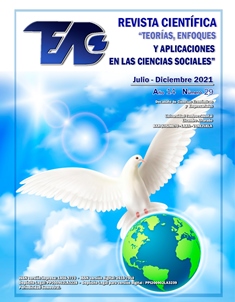The Vertical coordination in the pig production chain in Lara state for the year 2017
Keywords:
heavy transport, competitiveness, regulationAbstract
The purpose of this work is to analyze the vertical coordination in the pig production chain of Lara state for the year 2017, making use of the neo-institutional economic theory, since it establishes that the exchange of products and services can be carried out through of three modalities: open market, vertical integration and contracts. With this, it is intended that the agents involved know the factors that affect it and can establish measures that serve as a basis for the development of the sector. To achieve this objective, the methodology of "grounded theory" was used, which proposes to carry out a theoretical sampling for the collection of information, interviewing key personnel of the sector in the state, and achieving with them the theoretical saturation, which It was analyzed through a coding of the study variables. In this way, it was determined that independent producers work under the open market mechanism; while integrating companies are coordinated through vertical integration. Regarding transaction costs, integrating companies incur higher costs than independent producers; This, due to the greater frequency of their transactions and the amount of specific assets involved, thus being the determining factor in the vertical coordination mechanism used by each one. In addition, there is greater uncertainty in the transactional environment in independent producers than in integrated companies.
Downloads
References
Andréu, J., García-Nieto, A. y Pérez, M. 2007. Evolución de la Teoría Fundamentada como Técnica de Análisis Cualitativo. Primera Edición. Colección Cuadernos Metodológicos No. 40. Centro de investigaciones Sociológicas. España.
Corbin, J. y Strauss, A. 2008. Basics of Qualitative Research: Techniques and Procedures for Developing Grounded Theory. Third Edition. Sage Publications. USA.
El Impulso, 2016. Cifras rojas en producción de alimentos y medicamentos veterinarios. Artículo en línea. Disponible en: http://www.elimpulso.com/noticias/economia/cifras-rojas-en-produccion-de-alimentos-y-medicamentos-veterinarios. (Consulta: Noviembre 11, 2016)
Faiguenbaum, S. 1992. Modos de integración entre agricultura y agroindustria. El caso de la agricultura de contrato con pequeños productores en Chile. Río de Janeiro, Universidad Federal de Río de Janeiro.
Food and Agriculture Organization of the United Nations, FAO. 2014. Oficina Regional de la FAO para América Latina y el Caribe. Ganadería. Página en línea. Disponible en: www.fao.org/americas/perspectivas/ganaderia/es/. (Consulta: Junio 02, 2014)
García, A.; Lara, A. y Tabeada, E. 2004. Coordinación Híbrida desde las perspectivas de Williamson y de Nooteboom. Análisis Económico. Vol. 19. N° 40.
Glaser, B., y Strauss, A. 1967. The Discovery of Grounded Theory: Strategies for Qualitative Research. Aldine de Gruyter. USA.
González, M. 1997. Metodología de la Investigación Social. Técnicas de Recolección de Datos. Primera Edición. Editorial Aguaclara. España.
Iciarte, M. 2012. Estudio de la cadena agroalimentaria de la producción porcina en la zona central del país bajo un enfoque de sostenibilidad. Trabajo de grado presentado como requisito final para opta al Título de Doctor de Ciencias Agrícola. UCV.
Méndez, C. 2009. Metodología. Diseño y Desarrollo del Proceso de Investigación con Énfasis en Ciencias Empresariales. Cuarta Edición. Editorial Limusa. México.
Observatorio de Derechos de Propiedad. 2016. Estadísticas de violaciones a la propiedad privada (2012-2016). Disponible en: http://paisdepropietarios.org/home/observatorio/estadisticas/. (Consulta: Febrero 28, 2017)
Posada, M. 1998. Agricultura, industria y contrato: una interpretación para el caso argentino. Universidad Nacional de Lujan. Argentina. Documento en línea. Disponible en: http://erevista.saber.ula.ve/index.php/agroalimentaria/article/view/1210. (Consulta: Junio 13, 2014)
Rodríguez, J. 1999. Introducción al enfoque del neo institucionalismo económico sobre la organización. Documento en línea. Disponible en: Http://www.alcala.es/estudios_de_organizacion/temas_organizcion_teor-organ12/introduccion-neoinstitucionalismo.htm. (Consulta: Junio 13, 2014)
Tamayo y Tamayo, M. 2003. El Proceso de la Investigación Científica. Cuarta Edición. Editorial Limusa. México.Universidad Católica Andrés Bello, Universidad Central de Venezuela y Universidad Simón Bolívar. 2016. Encuesta sobre Condiciones de Vida Venezuela 2016 ENCOVI. Disponible en: http://www.fundacionbengoa.org/noticias/2017/encovi-2016.asp. (Consulta: Febrero 28, 2017)
Williamson, O. 1989. Las instituciones económicas del capitalismo. Traducido por Eduardo Suarez del inglés “The economics institutions of capilalism”. Fondo de Cultura Económica. México.
Published
How to Cite
Issue
Section

This work is licensed under a Creative Commons Attribution-NonCommercial-ShareAlike 4.0 International License.
Derechos del/de autor/es a partir del año de publicación
Esta obra está bajo la licencia:
Creative Commons Reconocimiento-NoComercial-CompartirIgual 4.0 Internacional (CC BY-NC-SA 4.0)
Las opiniones expresadas por los autores no necesariamente reflejan la postura del editor de la publicación ni de la UCLA. Se autoriza la reproducción total o parcial de los textos aquí publicados, siempre y cuando se cite la fuente completa y la dirección electrónica de esta revista. Los autores(as) tienen el derecho de utilizar sus artículos para cualquier propósito siempre y cuando se realice sin fines de lucro. Los autores(as) pueden publicar en internet o cualquier otro medio la versión final aprobada de su trabajo, luego que esta ha sido publicada en esta revista.



